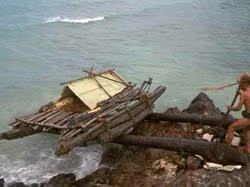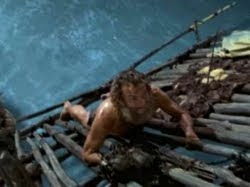Stage 1, Call to Adventure = Turbulence wakes Chuck Noland, who is sleeping on a FedEx planeThe real meat of the adventure happens in the second major portion, initiation. At this point, the hero faces many challenges which, if he successfully meets them, provide opportunity for growth in knowledge and competence. My students and I concluded that Noland does finish all of initiation.
Stage 2, Refusal of the Call = Noland, denying that the plane is in trouble, goes to the bathroom to wash his face
Stage 3, Supernatural Aid and Amulet = Albert Miller, a pilot, shoves a life raft into Noland's arms
Stage 4, Crossing of the First Threshold = With the help of the life raft, Noland makes it to the surface of the water, his old life sinking with the plane
Stage 5, Belly of the Whale = Noland reaches the deserted island, where he initially has no skills
 Road of Trials: Once the hero is swallowed into the unknown, lost to his old life, he discovers that he must acquire new skills to survive. Food pulled easily from a refrigerator or pantry and nuked in the microwave is no longer possible for Noland; neither is closing the snug door of his home to keep out the elements, or calling a friend by phone for companionship and conversation. So the next thing we observed was his slow development of basic survival skills: opening coconuts, finding shelter and water, building fire to cook crab, acquiring a companion in Wilson, the volleyball, and doctoring himself when he removes his own abscessed tooth. The degree of competence he develops living in primitive conditions is beautifully illustrated when the movie flashes forward four years, and the viewer finds a tan, lithe Noland easily spearing his dinner with the same ease he would have unwrapped a Filet-O-Fish in his old life.
Road of Trials: Once the hero is swallowed into the unknown, lost to his old life, he discovers that he must acquire new skills to survive. Food pulled easily from a refrigerator or pantry and nuked in the microwave is no longer possible for Noland; neither is closing the snug door of his home to keep out the elements, or calling a friend by phone for companionship and conversation. So the next thing we observed was his slow development of basic survival skills: opening coconuts, finding shelter and water, building fire to cook crab, acquiring a companion in Wilson, the volleyball, and doctoring himself when he removes his own abscessed tooth. The degree of competence he develops living in primitive conditions is beautifully illustrated when the movie flashes forward four years, and the viewer finds a tan, lithe Noland easily spearing his dinner with the same ease he would have unwrapped a Filet-O-Fish in his old life. Meeting with the Goddess: Noland has his own Athena, the Woman of the Golden Wings, who is a constant presence during his island adventure, just as Athena aided Odysseus in his long journey home from the Trojan War. Noland first encounters his goddess drawn on the one FedEx package that, after it washes ashore, he does not open. The mysterious contents—a waterproof satellite phone, perhaps?—give the package a palpable power. The goddess makes a big appearance in his life when she manifests as the Port-O-Let banging against the rocks on the beach. Noland retrieves the mangled aluminum and stands it in the sand where it resembles an abstract angel. He and Wilson then sit in a circle with her until Noland finally understands her message, that he needs wings himself to get past the breakers that fence the island. Her gift of wings in the guise of the Port-O-Let is the one thing Noland must have to continue his journey.
Meeting with the Goddess: Noland has his own Athena, the Woman of the Golden Wings, who is a constant presence during his island adventure, just as Athena aided Odysseus in his long journey home from the Trojan War. Noland first encounters his goddess drawn on the one FedEx package that, after it washes ashore, he does not open. The mysterious contents—a waterproof satellite phone, perhaps?—give the package a palpable power. The goddess makes a big appearance in his life when she manifests as the Port-O-Let banging against the rocks on the beach. Noland retrieves the mangled aluminum and stands it in the sand where it resembles an abstract angel. He and Wilson then sit in a circle with her until Noland finally understands her message, that he needs wings himself to get past the breakers that fence the island. Her gift of wings in the guise of the Port-O-Let is the one thing Noland must have to continue his journey.Woman as Temptress: In this stage of the cycle, physical pleasures, usually offered by a woman, tempt the hero to leave the uncomfortable adventure. When Noland realizes that his gift of "wings" can get him past the breakers, Wilson brings up the dangers and uncertainties of leaving. The island certainly isn't modern life, but it does offer the comfort of a full belly, the protection of a stone cave. Wilson, the nagging wife-like fragment split from Noland's personality, unsuccessfully tempts our hero with the island herself, Gaia, Mother Earth.
 Atonement with the Father: I think that Noland experiences Campbell's "at one ment" with Father Time. In this stage, the hero must come to realize that he shares a belief or ability with a strong male—his biological father, a father figure, a masculine force. Until atonement, the hero previously thought himself incapable of having this belief or ability. This semester, we discussed both Luke Skywalker, who at first thinks he is incapable of going over to the dark side of the Force as Darth Vader did but then realizes that he too can entertain the temptation; and Neo, who at first believes he is incapable of the same level of commitment that Morpheus models but then demonstrates it himself as he rescues Morpheus from the Agents. Sometimes the "father" is evil, like Darth Vader, or good, like Morpheus. Either way, the father represents a force initially in opposition to the hero but one which the hero eventually embraces.
Atonement with the Father: I think that Noland experiences Campbell's "at one ment" with Father Time. In this stage, the hero must come to realize that he shares a belief or ability with a strong male—his biological father, a father figure, a masculine force. Until atonement, the hero previously thought himself incapable of having this belief or ability. This semester, we discussed both Luke Skywalker, who at first thinks he is incapable of going over to the dark side of the Force as Darth Vader did but then realizes that he too can entertain the temptation; and Neo, who at first believes he is incapable of the same level of commitment that Morpheus models but then demonstrates it himself as he rescues Morpheus from the Agents. Sometimes the "father" is evil, like Darth Vader, or good, like Morpheus. Either way, the father represents a force initially in opposition to the hero but one which the hero eventually embraces.At the beginning of the movie, Noland believes that time is consistent and controllable. A package sent from the United States to Russia should arrive in x hours, every time, even if one has to steal a bicycle from a crippled child to finish the delivery. Noland realizes, however, as he is about to launch his raft, that time is inconsistent and mysterious, a fact he must accept as he sends himself as a package back home, not knowing when, or where, or even if, he will arrive.
 Apotheosis and the Ultimate Boon: The last two stages of initiation quickly follow one another. The hero recognizes his superior ability and completes a difficult task with ease. Noland had demonstrated that he was a frail, puny human after he first arrived on the island. One night he spied a light on the horizon and got back in his life raft to paddle out to it. The island, at this point, would not let him leave. The waves easily repelled his efforts, gashing his leg on the sharp coral, as the water threw him back to the beach.
Apotheosis and the Ultimate Boon: The last two stages of initiation quickly follow one another. The hero recognizes his superior ability and completes a difficult task with ease. Noland had demonstrated that he was a frail, puny human after he first arrived on the island. One night he spied a light on the horizon and got back in his life raft to paddle out to it. The island, at this point, would not let him leave. The waves easily repelled his efforts, gashing his leg on the sharp coral, as the water threw him back to the beach.With his gift of Port-O-Let wings and a new raft he has built himself, Noland challenges the breakers again. Whereas the waves easily beat him back as an island neophyte four years ago, now Noland has the skill to fly right over them. Even to himself, he must feel he has god-like abilities in comparison to the man who washed ashore after the plane crash. Leaving the island so easily is his ultimate boon.
Tomorrow ... Noland is now ready to return, the third major portion of the cycle!


